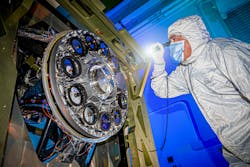BAE Agrees to Buy Ball Aerospace for $5.55 Billion
British military equipment maker BAE Systems announced on Thursday that it had agreed to buy U.S. company Ball Aerospace from the Ball Corporation for about $5.55 billion.
BAE said it hoped to complete the acquisition of the aerospace firm in the first half of 2024, with an anticipated tax credit taking the "underlying economic consideration for the business" to $4.8 billion.
The proposed deal will be funded by a combination of new external debt and existing cash resources, it added.
Colorado-based Ball Aerospace supplies spacecraft, mission payloads, optical systems and antenna systems, and counts the U.S. Department of Defense and civilian space agencies among its clients.
It has more than 5,200 employees, of whom over 60% hold U.S. security clearances.
The business is "well positioned to capture expected increases in demand for missiles and munitions", BAE said in a statement announcing the acquisition.
Describing the aerospace firm as a "space and defence technology leader", BAE said it was a "highly complementary fit" with its own "portfolio and culture".
"It's rare that a business of this quality, scale and complementary capabilities, with strong growth prospects and a close fit to our strategy, becomes available," BAE Systems Chief Executive Charles Woodburn said.
"The strategic and financial rationale is compelling, as we continue to focus on areas of high priority defence and Intelligence spending," he added.
Earlier this month, BAE announced a record order book and half-year jump in net profits of 57%, as government defence spending increases amid the war in Ukraine.
However, its share price on the London Stock Exchange dipped on opening Thursday by more than 4%, to below 960 pence per share.
Aarin Chiekrie, of Hargreaves Lansdown, called the deal's $5.55-billion price tag "mammoth", noting it was equivalent to almost 20% of BAE's current market capitalization.
But he added the acquisition should add around $2.2 billion in revenue to its top line, "before growing at a compound rate of around 10% annually over the next five years".
"And given the similarities between the two businesses, there's clear scope to streamline operations, cut costs and boost profit margins," Chiekrie said.
Copyright 2023, Agence France-Presse
About the Author
Agence France-Presse
Copyright Agence France-Presse, 2002-2025. AFP text, photos, graphics and logos shall not be reproduced, published, broadcast, rewritten for broadcast or publication or redistributed directly or indirectly in any medium. AFP shall not be held liable for any delays, inaccuracies, errors or omissions in any AFP content, or for any actions taken in consequence.
